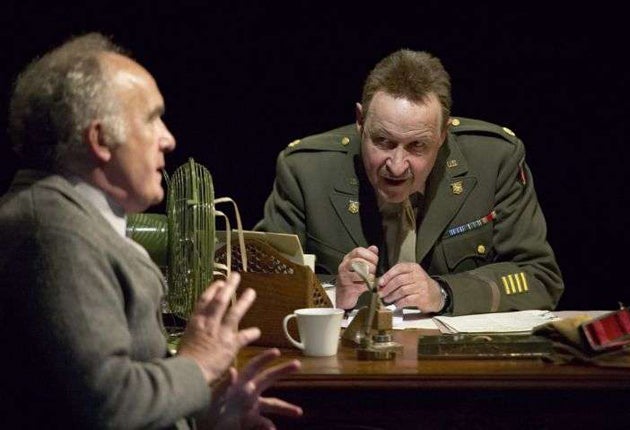Taking Sides/Collaboration, Duchess Theatre, London

Your support helps us to tell the story
From reproductive rights to climate change to Big Tech, The Independent is on the ground when the story is developing. Whether it's investigating the financials of Elon Musk's pro-Trump PAC or producing our latest documentary, 'The A Word', which shines a light on the American women fighting for reproductive rights, we know how important it is to parse out the facts from the messaging.
At such a critical moment in US history, we need reporters on the ground. Your donation allows us to keep sending journalists to speak to both sides of the story.
The Independent is trusted by Americans across the entire political spectrum. And unlike many other quality news outlets, we choose not to lock Americans out of our reporting and analysis with paywalls. We believe quality journalism should be available to everyone, paid for by those who can afford it.
Your support makes all the difference.If you want a writer who can make even the Holocaust dull, look no further than Ronald Harwood. In Taking Sides (1995) and Collaboration (first seen last year at Chichester, where Philip Franks's productions originated), Harwood scrutinises two great classical musicians, asking whether they simply endured the Nazi terror or actively helped it. Both plays are flaccid in language and construction, with unconvincing, one-note characters and verbal music for tin ears.
In Taking Sides, set in a postwar denazification unit, David Horovitch's gentile American major spends the whole play yelling and swearing at everyone, including Wilhelm Furtwängler, who, he says, by remaining in Berlin throughout the war to conduct the Philharmonic, helped legitimise the Reich. The major gleefully cries that he has "nailed the bastard" on hearing that Furtwängler once sent Hitler a telegram on his birthday. Yet Furtwängler, at the risk of his own life, helped many Jews to escape from Germany. Would it have been more honourable to leave, as the major says he should have, and let them be killed?
The major's coarseness and brutality might seem to suggest that the Nazi-hunter has himself turned Nazi, but this obvious irony seems precluded by Harwood's pointing out, in a programme note, that he is the only one to mention the dead. So he is apparently intended to demonstrate that philistines (the major refers to Furtwängler as "the bandleader") can be more humane than great artists, no doubt a proposition pleasing to many in the audience. What he ends up representing, however, like all bullies, is weakness – his author's.
Like Taking Sides, Collaboration ends with an old man, in this case Richard Strauss, in tears before an investigator. Strauss wrote an opera that was banned because his librettist, Stefan Zweig, was Jewish (for all his research, which he scatters as aimlessly as confetti, Harwood does not include a wonderful joke – the Nazis also denounced the author of the source material, the "Jew" playwright Ben Jonson). Showing the artist as someone who immerses himself so deeply in his own world that he does not notice that the real one is crumbling, this play promises to be more complex (is "naivety", the follower's favourite defence, really selfishness and vanity?), but it, too, is limp and muddled. Strauss's acquiescence to the Nazis is excused by his wish to protect his Jewish daughter-in-law and grandchildren, but the few, brief mentions of them register only as debating points. When he whimpers at the end, "I was reduced to composing kitsch", one does not know whether to pity him or to retort that millions were reduced to ashes.
Harwood's vulgarity shows itself here in the folksy portrait of a genius as a cosy grandpa and his wife as a fierce hausfrau who tells Jew and Nazi alike, "Wipe your feet!".
The flatness of the performances matches that of the plays. Michael Pennington is stiff and austere as Furtwängler, a hippity-hoppity bunny rabbit as Strauss. David Horovitch's major has no shading or variety, and his Stefan Zweig is monotonously modest and reserved. But the most disheartening thing about these plays is their timing. Not only dictators and peasants but educated Westerners now cry that the Holocaust never existed, and that Israelis are the new Nazis. The latter charge is the subject of plays in this country (Horovitch even appeared in one, Seven Jewish Children), and Jewry is in peril as it has not been since the war. And what is the theatrical response? Two plays boldly denouncing those who persecuted Jews 70 years ago. You couldn't make it up.
To 29 August (0844 412 4659; www.duchesstheatre.co.uk)
Join our commenting forum
Join thought-provoking conversations, follow other Independent readers and see their replies
Comments